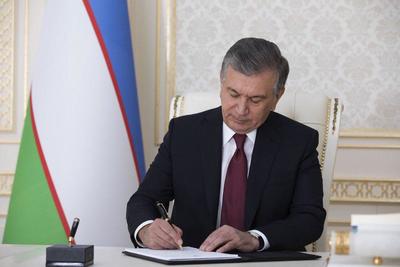On December 23, President Shavkat Mirziyoyev signed the new version State Secrets Bill into Law with effect as of March 29, 2025.
The previous law was adopted in 1993, so there was a need to improve the legal framework for regulating relations in this area, the senators noted.
The old version has been failing to define the powers of the bodies in the field of protecting state secrets, the degree of confidentiality, the timelines for classification of information and the issuance of permission to use state secrets. Because of this, the legal basis for the use and deal with state secrets is interpreted differently.
In addition, the procedure for working with state secrets and their protection, ensuring the secrecy regimen and regulating work in a secret regime were approved on the basis of secret resolutions of the Cabinet of Ministers.
This leads to the fact that citizens of Uzbekistan, foreigners and stateless persons do not know at the proper level about the rights to use state secrets.
Also, the procedure for issuing permission to familiarize oneself with state secrets, the list of information that is not subject to classification, and the mechanism for the mutual exchange of state secrets with other countries have not been regulated before.
The new version has outlined that the uniform state policies in the field of state secrets shall be determined by the president, and also specifically defines the respective powers of the Cabinet of Ministers, the State Security Service and other organizations that use state secrets. In the old law, the powers were defined only for the State Security Service, which remains a specially authorized state body.
In particular, the Cabinet of Ministers shall:
- enter into intergovernmental agreements on the mutual protection of classified information and takes measures to implement them;
- determine the procedure for providing state secrets to foreign states and international organizations;
- set up the procedure for the creation of regime-secret bodies, their activities and liquidation;
- determine the procedure for formalizing the right to use state secrets;
- determine the procedure for classifying information as state secrets, classifying and declassifying them, as well as protecting state secrets and their carriers in organizations using state secrets;
- approve the list of information subject to classification in Uzbekistan;
- set up the procedure for determining the amount of damage that has been or may be caused to the security of Uzbekistan or the interests of organizations as a result of the disclosure or loss of state secrets;
- set up the procedure for determining the amount of damage caused to the owner of the information carriers as a result of classifying information and their carriers;
and others.
Organizations using state secrets apply to the State Security Service (DXX) for permission to carry out activities related to state secrets, create the necessary conditions for the full functioning of regime-secret bodies, appoint employees with the appropriate qualifications and certificates issued by a specially authorized state body, provide training for persons authorized to use state secrets, and have other powers.
A specific list of four categories of information that are subject to classification as a secret of state significance shall be approved:
- military sphere;
- foreign policy and foreign economic spheres;
- information in the sphere of intelligence and counterintelligence, operational-search activities and other spheres of state security;
- information from the economic, educational, scientific and technical spheres.
Previously, this list was specified in the government decree of 1994 under the heading secret.
Classification procedure
The classification of information as state secrets and their classification shall be carried out on the basis of the list of information subject to classification.
Measures for dissemination, provision and (or) establishment of restrictions, based on the level of secrecy of information, shall be carried out within the requirements of the legislation on state secrets.
The list of classified information shall be approved by the Cabinet of Ministers in agreement with the State Security Service on the basis of information classified as state secrets and based on proposals from the central bodies of organizations using state secrets.
The heads of organizations using state secrets are personally responsible for their decision to include information as a state secret.
The following three levels of secrecy of information constituting state secrets are established, and the corresponding secrecy classifications for carriers of the said information:
First level of secrecy - Special Importance;
Second level of secrecy - Highly Classified;
Third level of secrecy - Classified.
The period of classification of information constituting state secrets shall not exceed 30 years for secrets of state importance and 10 years for official secrets.
Information not subject to classification
Some information cannot be classified as a state secret:
- emergency situations threatening the life and health of citizens;
- natural disasters, their forecasts and consequences;
- the state of the environment, health care, education, culture, demography and social security;
- the state of crime and parameters of the state budget;
- violations of human rights and freedoms, as well as legislation by state bodies.
Other information, the dissemination of which is not limited by law.
Officials who have made an unfounded decision to classify such data are liable, and citizens can challenge such decisions in court.
Organizations that possess state secrets have the right to enter into agreements on the alienation of information from owners. The agreement specifies the amount of compensation to the owner of the information and the obligation to keep the information confidential.
In the event of the owner's refusal, alienation may be carried out forcibly by a court decision with the payment of compensation.
However, the right of ownership of information belonging to foreign citizens and organizations cannot be limited if it was prepared without violating the law.
Citizens have the right to challenge such decisions in court.
Clearance to state secrets
Access to state secrets is regulated on the basis of the nomenclature of positions requiring clearance.
Clearance is issued by the State Security Service. Persons who do not have clearance cannot be appointed to positions requiring access to state secrets.
Clearance can be issued to citizens of Uzbekistan, foreign citizens and stateless persons (subject to compliance with international treaties).
To obtain access to state secrets, a written commitment to non-disclosure of information, written consent to limit one's rights in accordance with the law, consent to verification activities carried out by an authorized state body, and familiarization with the legislation on state secrets, including measures of responsibility for its violation, are required.















